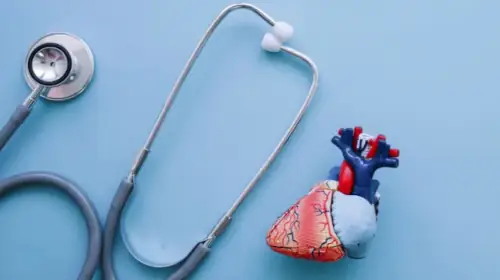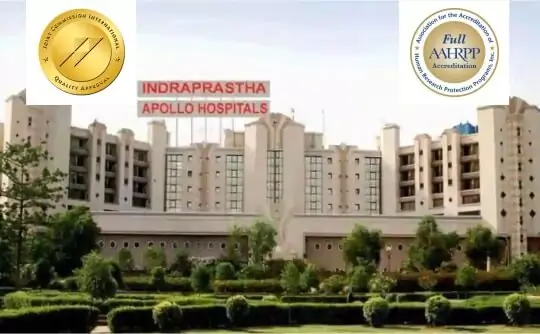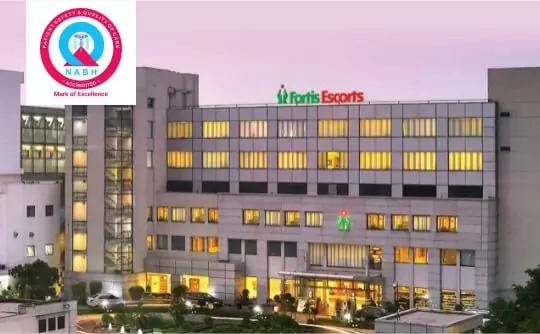

A significant component of a Minimally Invasive Heart Bypass Cost in India is the heart surgeon's fees. IndiCure recommends highly experienced, skilled, board-certified heart surgeons who can deliver excellent results. While the charges may vary based on the surgeon's experience, you can be confident that you are in safe and capable hands cardiac surgeons recommended by IndiCure Health Tours.
In the pursuit of achieving better outcomes for surgery and patient care, the medical field keeps introducing new technologies into surgical procedures. These enhancements are designed to reduce recovery times, improve outcomes and increase the overall effectiveness of medical treatments. While these advancements can significantly benefit patients, they may also lead to higher costs for Minimally Invasive Heart Bypass Cost in India.
For a successful Minimally Invasive Heart Bypass in India, selecting an accredited medical facility in India with skilled and qualified medical staff is essential. Generally the larger cities in India provide superior medical facilities and more experienced heart surgeons, leading to higher costs of surgery. With the goal of prioritizing the safety of our foreign patient guests, IndiCure Health Tours recommends surgical facilities in these larger cities of India.
The surgery-related expenses include the costs incurred pre- and post-surgery. The costs incurred pre-surgery are associated with kind and number of investigations required, which depend on the age and medical condition of the patient. Post-surgical expenses include cost of prescription medications and expenses incurred for follow-up consultations.
At IndiCure Health Tours, we consolidate most of the expenses for your Minimally Invasive Heart Bypass Cost in India to provide you with an inclusive package tailored to your budget and individual requirements. After receiving medical reports, your case manager will provide an estimated cost based on a discussion with the heart surgeon.
The final Minimally Invasive Heart Bypass Cost in India can however be confirmed after your face-to-face consultation with the heart surgeon in India.

We Help you Choose the Right Treatment, Surgeon & Hospital

We Arrange Video/Telephonic Consultation with the Surgeon

We Assist you with Visa & Accommodation

We Receive you at the Airport and Drop you at Hotel/Hospital

We Assist you the at Hospital & Provide Post Operative Support
IndiCure Health Tours enables exclusive savings on your medical travel to India. We partner with top hospitals in India and negotiate special rates with them. This ensures you get the best possible price on your healthcare when you plan your medical travel with us.

Here is a set of questions you should consider asking before commencing your medical travel for Minimally Invasive Heart Bypass in India.
Prepare to answer questions about your:
A less invasive alternative to coronary artery bypass graft surgery is minimally invasive coronary artery bypass surgery, often known as beating heart surgery (CABG). Traditional CABG surgery has risks, such as the need for a heart-lung bypass machine and a longer recovery time. Minimally invasive bypass surgery can restore blood flow to the heart without the risks, complications, and need for a heart-lung bypass machine.
Rather than cutting through the breastbone as in open-heart surgery, minimally invasive heart surgery entails making small incisions in the right side of the chest to reach the heart between the ribs.
You don't require a heart-lung bypass machine since beating heart surgery is done while your heart is still beating. Minimally invasive coronary artery bypass surgery is divided into two types:
Minimally invasive direct coronary artery bypass (MIDCAB)
If your doctor chooses MIDCAB surgery for you, you will not require the use of a heart-lung bypass machine to keep your heart beating throughout the surgery. In contrast to standard CABG surgery, your doctor will make tiny incisions in your chest to obtain access to your coronary arteries. In contrast to typical CABG surgery, which exposes the entire heart, the smaller incisions just expose the portions of the arteries that require grafts.
Off-pump coronary artery bypass (OPCAB)
OPCAB is a type of minimally invasive coronary artery bypass surgery that does not require the use of a heart-lung bypass machine and requires a smaller incision. Your cardiovascular surgeon will utilize an artery or vein from another part of the body to bypass the blocked vessel and restore normal blood flow during an off-pump coronary artery bypass procedure. Patients who undergo OPCAB have less pain and a faster recovery period than those who have standard CABG procedures.
When compared to open-heart surgery, the following are some of the potential advantages of minimally invasive heart bypass surgery:
Besides heart bypass, a variety of cardiac problems can be treated using minimally invasive heart surgery. This includes:
Not everyone is a candidate for minimally invasive heart bypass surgery. Your doctor and treatment team will work with you to see if it's a viable therapy choice for you.
The ideal candidates are those who:
Your doctor will likely evaluate your medical history and run tests to learn more about your heart health in order to assess whether minimally invasive heart surgery is the best option for you.
The procedure for minimally invasive coronary bypass surgery can be done in a number of ways:
In this method, the surgeon uses a robot to bypass the blocked vessel. The surgeon controls the robotic arms remotely while watching the heart on a 3D monitor. The procedure takes place in a Cath lab, where a small, flexible catheter is inserted into an artery in the groin. This catheter contains a tiny device to assist in the bypass.
In this approach, the surgeon makes a small incision in the chest and inserts a thoracoscope, a tool equipped with a video camera. Surgical instruments are passed through the thoracoscope to the heart, allowing the surgeon to perform the procedure with minimal disruption to the surrounding tissue.
The surgeon creates a 2–3-inch incision between the ribs (often called a mini-thoracotomy) to access and bypass the blocked vessel. This method eliminates the need to cut through the sternum (breastbone), resulting in less trauma, faster healing, and reduced pain compared to traditional open-heart surgery.
Recovery time is shorter following a minimally invasive coronary bypass than it is after a standard CABG. You'll generally spend a day or so in the intensive care unit (ICU). and about 4-5 days in a private hospital room to recover from the procedure. Within a week of your operation, you will have a follow-up appointment.
As you restore strength, it may take a few weeks for you to recover. You can be referred to a cardiac rehabilitation program to help you return to your regular activities safely.
The cardiac symptoms will be relieved and your quality of life will be improved with minimally invasive heart bypass surgery.
To keep track of your heart condition, you'll need to see a doctor regularly. Your heart's health may be assessed through tests.
Your doctor will also advise you to live a heart-healthy lifestyle, which includes eating a balanced diet, exercising regularly, managing stress, and not smoking. A tailored program of education and exercise to promote health after heart surgery is also recommended (cardiac rehabilitation).

New Delhi
Indraprastha Apollo Hospitals, New Delhi is a state of the art multi speciality tertiary-care hospital situated in the most posh area of South Delhi. Considered to be the flagship hospital of Apollo group, Indraprastha Apollo Hospital is one of the important landmarks not only in Delhi, but in the world map because of its popularity among the medical tourists. The hospital has been one of the most sought after medical institutions for patients from Asia Pacific and beyond.

New Delhi
Fortis Escorts Heart Institute and Research Centre is one of the most revered medical institutions not only in India, but the entire world. The institute has set benchmarks in cardiac care with path-breaking work over the last 25 plus years. The hospital has the most advanced technology and has seen the best outcomes even in the most complex cardiac cases; be it cardiac surgery, Interventional Cardiology, Pediatric Cardiology, Pediatric Cardiac Surgery or Non-invasive Cardiology
Minimally invasive heart surgery typically lasts two to three hours, depending on the complexity of the procedure and the patient's condition. Factors like the number of vessels being bypassed, anesthesia administration, and post-surgical monitoring may slightly affect the total time.
The key difference lies in how the surgeon accesses the heart. In traditional CABG (Coronary Artery Bypass Grafting), the breastbone (sternum) is cut in half to expose the heart, resulting in a longer recovery period of up to 8 weeks as the bone heals. In Minimally Invasive CABG (MIC CABG), the surgeon makes a small incision on the side of the chest, avoiding bone cutting. This technique results in faster recovery (around 12-14 days) and less pain, with fewer risks of complications like infections.
Yes, diabetic patients are suitable candidates for minimally invasive heart surgery. In fact, this approach is often preferred since it involves smaller incisions and a reduced infection risk, which is particularly beneficial for patients with diabetes, as they are more prone to wound-healing complications.
Recovery time varies depending on the patient's overall health and the complexity of the surgery. Most patients can resume normal activities within 2-4 weeks. However, activities like heavy lifting or intense exercise may require clearance from the doctor to avoid complications.
Patients are typically discharged 5-6 days after the surgery, assuming no complications arise. Full recovery to resume normal daily activities usually takes another 2-3 weeks, depending on the patient's progress and overall health.
Smoking is strictly prohibited after surgery as it can impair healing, increase the risk of complications, and negatively affect heart health. Moderate alcohol consumption is generally allowed after recovery, but it is important to follow your doctor's advice on drinking limits to avoid putting stress on the cardiovascular system.
Most patients can safely resume sexual activity within 6-8 weeks after surgery, depending on how well they recover. If there are no complications, patients are usually encouraged to return to normal life, including sexual activity, once they feel physically comfortable.
The use of blood thinners after surgery is essential to prevent clots but must be carefully managed to avoid excessive bleeding. Patients who were on daily blood thinners before surgery typically stop taking them 24 hours to a week before the procedure. After surgery, the cardiologist will prescribe anticoagulants or antiplatelet medications for a specific duration, often several months or longer, based on the patient's individual needs and risk factors.
After CABG surgery, patients should avoid:
Yes, it is generally safe for patients aged 70 to 75 to undergo coronary artery bypass surgery. As coronary artery disease is more common in older adults, many patients in this age group benefit from the surgery to improve heart function and quality of life. Advances in minimally invasive techniques have made the procedure safer, even for elderly individuals, with reduced recovery times and lower risks of complications.
When planning your medical trip to India for minimally invasive heart bypass surgery, it is essential to account for several other expenses beyond the cost of surgery itself. Proper budgeting will help ensure a smooth recovery and a stress-free stay. Here's a breakdown of costs to plan for:
You will need to budget for daily meals throughout your stay, both for yourself and any companions traveling with you. Depending on your dietary preferences and choice of dining (e.g., hotel restaurants, local eateries, or delivery services), meal costs can vary. Some hospitals or accommodations may offer meal packages, which could help you save.
Flight expenses are a key component of your medical trip to India. Airfare costs will depend on several factors, including your departure location, travel season, class of travel, and how far in advance you book your tickets. Booking early and monitoring for discounts or promotional fares can help reduce costs.
Once in India, you'll need to arrange local transportation. This includes taxi fares, ride-sharing services (like Ola or Uber), or private rental cars to travel between the airport, hotel, and hospital. Depending on your treatment schedule and recovery needs, you may also need to budget for trips to pharmacies or follow-up appointments.
Your lodging during recovery is another critical factor to plan for. You can opt to stay in a hotel near the medical facility for convenience or explore alternative options, such as service apartments, Airbnb rentals, or hospital guest houses, based on your budget and personal preferences. Some facilities may even offer special accommodation packages for international patients.
By carefully accounting for meals, airfare, transportation, and accommodation, alongside the Minimally Invasive Heart Bypass Cost in India, you can create a comprehensive budget. This will ensure a comfortable and well-planned trip, allowing you to focus on your recovery without unexpected financial stress.
Enhance your medical journey to India by availing these extra services.
Traveling abroad for medical reasons may be challenging. With our experience of over a decade and working with the best surgeons and top hospitals in India, we help make your medical tour easier and safer for you. We will guide you at every step of the way and make end-to-end arrangements for your surgery, travel, and stay.
Ramandeep Dhaliwal
a month ago
I had great experience having rhinoplasty through Indicure. Dr. Ruchika from Indicure has helped me in finding best plastic surgeon, answering all my questions...
Read More
Joshua Archer
3 months ago
My name is Joshua Archer I'm from New Zealand, bay of plenty, kawerau I opted for the bypass surgery in January 2023 but planned it in advance for 28 September found IndiCure...
Read More
Kera Ren
8 months ago
Absolutely loved my experience with IndiCure - from first inquiring to meeting the surgeon pre op to my follow up post op. The surgeon was extremely approachable...
Read More
Andreana Paul
5 months ago
Had a wonderful experience. Visited India for my plastic surgery. From sending mails, airport pickup, comfortable accommodation and, to smooth hospital appointment booking...
Read More
Brandi Luce
5 months ago
I had the privilege of using Indicure's services for a cosmetic procedure that I had wanted for a long time but had always been apprehensive about. Ruchika helped me...
Read More
Jade M
3 years ago
Indicure Health Tours went above and beyond my expectations. They helped me with every aspect of my journey and were professional, kind and caring. I was...
Read More
The content on the website (www.indicure.com) is intended to be general information and is provided only as a service. All photographs on our website of before and after results are examples only, and do not constitute an implied or any other kind of certainty for the result of surgery.
Learn about IndiCure Health Tours' comprehensive editorial policy that strives to deliver trustworthy, helpful, relevant, accurate and people-first content on medical tourism in India.
It is not medical advice and should not be taken as medical advice. It should not be used to diagnose or treat a health condition and is in no way meant to be a substitute for professional medical care. You are advised to see a surgeon in person to assess what surgery may or may not accomplish for you.
It is also important to keep your expectations realistic and to understand that all surgical procedures carry risks and should never be taken lightly.